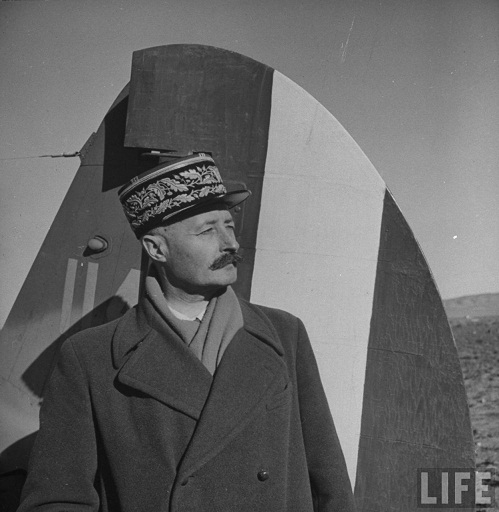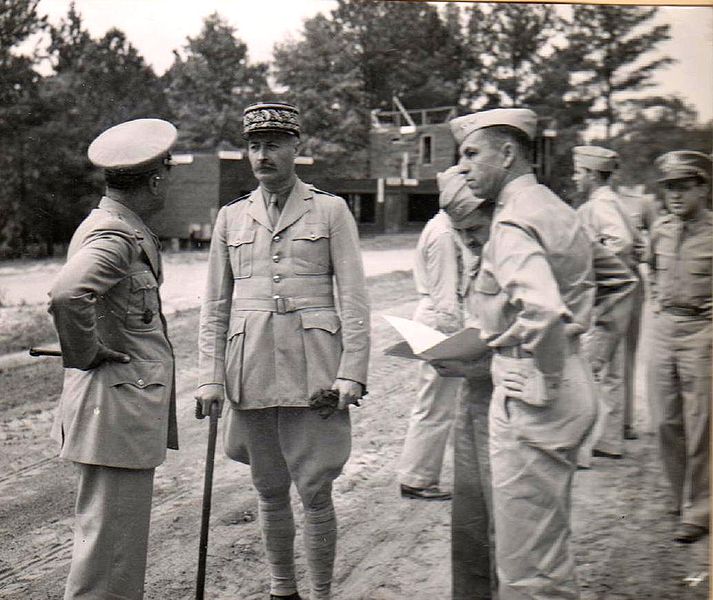<Back to Index>
- Physicist Paul Ehrenfest, 1880
- Composer Vassilis Tsitsanis, 1915
- Général d' Armée Henri Honoré Giraud, 1879
PAGE SPONSOR


Henri Honoré Giraud (18 January 1879 – 11 March 1949) was a French general who fought in World War I and World War II. Captured in both wars, he escaped each time. After his second escape, he joined the Free French Forces.
Henri Giraud was born in Paris, of Alsatian descent. He graduated from the Saint - Cyr Military Academy in 1900 and joined the French Army, serving in North Africa until he was transferred back to France in 1914 when World War I broke out, when he commanded Zouave troops. He was captured in the Battle of Guise in August 1914, when he was seriously wounded, but escaped two months later and returned to France via the Netherlands.
Afterwards, Giraud served with French troops in Constantinople under General Franchet d'Esperey. In 1933, he was transferred to Morocco to fight against Rif (kabyle) rebels. He was awarded the Légion d'Honneur after the capture of Abd-el-Krim and later became the military commander of Metz. When World War II began, Giraud was a member of the Superior War Council, and disagreed with Charles de Gaulle about
the tactics of using armoured troops. He became the commander of the
7th Army when it was sent to the Netherlands on 10 May 1940 and was
able to delay German troops at Breda on 13 May. Subsequently, the depleted 7th Army was merged with the 9th. While trying to block a German attack through the Ardennes, he was captured by German troops at Wassigny on 19 May. He was taken to Königstein Castle near Dresden which was used as a high security POW prison. Giraud
planned his escape carefully over two years. He learned German and
memorised a map of the surrounding area. On 17 April, 1942, he lowered
himself down the cliff of the mountain fortress. He had shaved off his
moustache, and, wearing a Tyrolean hat, traveled to Schandau to meet his SOE contact. Through various ruses, he reached the Swiss border and eventually slipped into Vichy France. After escaping from prison, he told Marshal Pétain that Germany would lose and they must resist. The Vichy government refused to return Giraud to the Germans. Giraud's escape was soon known all over France. Heinrich Himmler ordered the Gestapo to assassinate him, and Pierre Laval tried
to persuade him to return to Germany. Giraud supported Pétain
and the Vichy government, but refused to cooperate with the Germans. He was secretly contacted by the Allies, who gave him the code name Kingpin. Giraud was already planning for the day when American troops landed in France. He agreed to support an Allied landing in French North Africa,
provided that only American troops were used, and that he or another
French officer was the commander of such an operation. He considered
this latter condition essential to maintaining French sovereignty and
authority over the Arab and Berber natives of North Africa. Giraud designated General Charles Mast as his representative in Algeria. At a secret meeting on 23 October with U.S. General Mark W. Clark and diplomat Robert Murphy,
the invasion was agreed on, but the Americans promised only that Giraud
would be in command "as soon as possible". Giraud, still in France,
responded with a demand for a written commitment that he would be
commander within 48 hours of the landing, and for landings in France as
well as North Africa. Giraud also insisted that he could not leave
France before 20 November. However, Giraud was persuaded that he had to go. On 5 November, he was picked up near Toulon by the British submarine Seraph (which was clumsily disguised as a U.S. vessel to placate Giraud). (Eisenhower
had advised contrary to his request for an aeroplane that he be fetched
by the British submarine under an American captain.).Seraph took him to meet General Dwight Eisenhower in Gibraltar. He arrived on 7 November, only a few hours before the landings.
Eisenhower asked him to assume command of French troops in North Africa
during Operation Torch and direct them to join the Allies. But
Giraud had expected to command the whole operation, and adamantly
refused to participate on any other basis. He said "his honor would be
tarnished" and "Giraud will be a spectator in this affair". However, by the next morning, he relented. He refused to leave immediately for Algiers,
but rather stayed in Gibraltar until 9 November. When asked why he did
not go to Algiers he replied: "You may have seen something of the large
De Gaullist demonstration that was held here last Sunday. Some of the
demonstrators sang the Marseillaise. I entirely approve of that! Others sang the Chant du Depart [a
military ballad]. Quite satisfactory! Others again shouted 'Vive de
Gaulle!' No objection. But some of them cried 'Death to Giraud!' I
don't approve of that at all." Pro-Allied elements in Algeria had agreed to support the Allied landings, and in fact seized Algiers on the night of 7 - 8 November; the city was then occupied by Allied troops. However, resistance continued at Oran and Casablanca.
Giraud flew to Algiers on 9 November, but his attempt to assume command
of French forces was rebuffed; his broadcast directing French troops to
cease resistance and join the Allies was ignored. Instead, it appeared that Admiral Darlan,
who happened to be in Algiers, had real authority. Even Giraud realized
this. Despite Darlan's Vichyite reputation, the Allies recognized him
as head of French forces, and he ordered the French to cease fire and join the Allies on 10 November. On 11 November, German forces occupied southern France.
Negotiations continued in Algiers; by 13 November, Darlan was
recognized as high commissioner of French North and West Africa, while
Giraud was appointed commander of all French forces under Darlan. All this took place without reference to the Free French organization of De Gaulle, which had claimed to be the legitimate government of France in exile. Then
on 24 December, Darlan was assassinated under mysterious circumstances.
On the afternoon of 24 December 1942, the admiral drove to his offices
at the Palais d'Ete and was shot down at the door to his bureau by a
young man of 20, Bonnier de la Chapelle, a monarchist. The young man was tried by court martial under Giraud's orders and executed on the 26th. With the strong backing of the Allies, especially Eisenhower, Giraud was elected to succeed Darlan.
After Admiral Darlan's assassination, Giraud became his de facto successor with Allied support. This occurred through a series of consultations between Giraud and de Gaulle.
De Gaulle wanted to pursue a political position in France and agreed to
have Giraud as commander - in - chief, as the more militarily qualified of
the two. It is probable that he ordered that many French resistance
leaders who had helped Eisenhower's troops be arrested, without any
protest by Roosevelt's representative, Robert Murphy. Giraud took part in the Casablanca conference,
with Roosevelt, Churchill and de Gaulle, in January 1943. Later, after
very difficult negotiations, Giraud agreed to suppress the racist laws,
and to liberate Vichy prisoners from the awful South Algerian
concentration camps. Henri Giraud and Charles de Gaulle then became
co-presidents of the Comité français de la Libération Nationale and Free French Forces. Giraud wanted to lift all racial laws immediately; however, only the Cremieux decree was
immediately restored by General de Gaulle. De Gaulle consolidated his
political position at Giraud's expense because he was more up to date
with the political situation. On 13 September, Giraud led the landings at Corsica arming Corsica's Communist oriented Front National resistance group. This drew more criticism from de Gaulle, and he lost the co-presidency in November 1943. When
the Allies found out that Giraud was maintaining his own intelligence
network, the French committee forced him from his post as a
commander - in - chief of the French forces. He refused to accept a post of
Inspector General of the Army and chose to retire. On 28 August 1944,
he survived an assassination attempt in Algeria. On 2 June 1946, he was elected to the French Constituent Assembly as a representative of the Republican Party of Liberty and helped to create the constitution of the Fourth Republic. He remained a member of the War Council and was decorated for his escape. He published two books, Mes Evasions (My Escapes, 1946) and Un seul but, la victoire: Alger 1942 - 1944 (A Single Goal, Victory: Algiers 1942 – 1944, 1949) about his experiences. Henri Giraud died in Dijon, France, on 11 March 1949.

